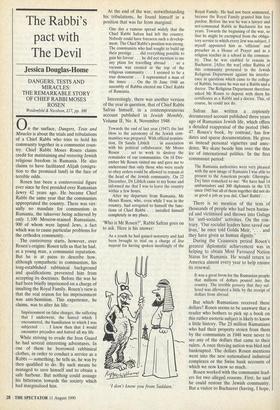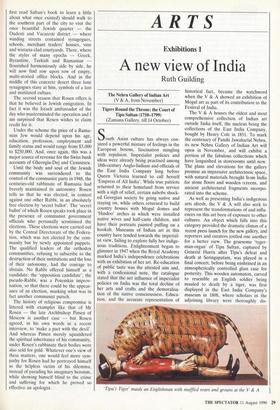The Rabbi's pact with The Devil
Jessica Douglas-Home
DANGERS, TESTS AND MIRACLES: THE REMARKABLE STORY OF CHIEF RABBI MOSES ROSEN
Weidenfeld & Nicolson, £17, pp. 300
0 n the surface, Dangers, Tests and Miracles is about the trials and tribulations of a Chief Rabbi who tries to hold his community together in a communist coun- try. Chief Rabbi Moses Rosen claims credit for maintaining and restoring Jewish religious freedom in Rumania. He also claims to have facilitated Alijah (emigra- tion to the promised land) in the face of terrible odds.
Rosen has been a controversial figure ever since he first presided over Rumanian Jewry 42 years ago. He became Chief Rabbi the same year that the communists appropriated the country. There was virt- ually no mandate for communism in Rumania, the takeover being achieved by only 1,100 Moscow-trained Rumanians, 900 of whom were lapsed Jews, a fact which was to cause particular problems for the orthodox community.
The controversy starts, however, over Rosen's origins: Rosen tells us that he had, as a young man, a communist reputation. But he is at pains to describe how, although sympathetic to communism, his long-established rabbinical background and qualifications prevented him from accepting its doctrines. Before the war he had been briefly imprisoned on a charge of insulting the Royal Family. Rosen's view is that the real reason for his imprisonment was anti-Semitism. This experience, he claims, was to alter his life:
Imprisonment on false charges, the suffering that I underwent, the hatred which I encountered, the humiliation to which I was subjected . . . I knew then that I would encounter prejudice and hatred all my life.
While striving to evade the Iron Guard he had several interesting adventures. In one of them he borrowed rabbinical clothes, in order to conduct a service as a Rabbi — something, he tells us, he was by then qualified to do. By such means he managed to save himself and to obtain a safe harbour. But nothing could assuage his bitterness towards the society which had marginalised him. At the end of the war, notwithstanding his tribulations, he found himself in a position that was far from marginal:
One day a rumour spread widely that the Chief Rabbi Safran had left the country. Nobody could have foreseen such a develop- ment. The Chief Rabbi's position was strong. The communists who had sought to build up their prestige . . . did everything possible to gain his favour . . . he did not mention to me any plans for travelling abroad . . . so a vacuum was created at the top of the religious community . . . I seemed to be a true democrat . . . I represented a man of the times . . On the 16 June 1948 an assembly of Rabbis elected me Chief Rabbi of Rumania.
Interestingly, there was another version of the year in question, that of Chief Rabbi Safran himself, in a contemporaneous account published in Jewish Monthly, Volume II, No. 8, November 1948:
Towards the end of last year (1947) the last blow to the autonomy of the Jewish com- munities was prepared. With official nomina- tion, Dr Sandu Liblich . . . in association with his political collaborator, Mr Moses Rosen . . . set to work to destroy the remainder of our communities. On 18 Dec- ember Mr Rosen visited me and gave me to understand that only those who were ready to obey orders could be allowed to remain at the head of the Jewish community. On 22 December, Dr Liblich came to my home and informed me that I was to leave the country within a few hours.
After my departure from Rumania, Mr Moses Rosen, who, even while I was in the country, had arrogated to himself the func- tions of Chief Rabbi . . . installed himself completely in my place.
`Who is Mr Rosen?', Rabbi Safran goes on to ask. Here is his answer:
As a youth he had gained notoriety and had been brought to trial on a charge of Ike majeste for having spoken insultingly of the 'I don't know you from Saddam.'
Royal Family. He had not been sentenced, because the Royal Family granted him free pardon. Before the war he was a lawyer and not-communal Rabbi in Bucharest for ten years. Towards the beginning of the war, so that he might be exempted from the obliga- tory service to which every Jew was subject, I myself appointed him as 'officiane and preacher in a House of Prayer and as a religion teacher in a school in the commun- ity. Thus he was enabled to remain in Bucharest. [After the war] other Rabbis of this community protested to the Jewish Religious Department against his interfer- ence in questions which came to the college of Rabbis, because he was not a Rabbi and a doctor. The Religious Department therefore asked Mr Rosen to deposit with them his certificates as a Rabbi and a doctor. This, of course, he could not do.
Safran has written a copiously documented account published three years ago of Rumanian Jewish life, which offers a detailed reappraisal of the period 1940- 47. Rosen's book, by contrast, has few dates and sparse documentation. He gives us instead personal vignettes and anec- dotes. We skate beside him over the thin ice of international politics. In the first communist period: The Rumania authorities were very pleased with the new image of Rumania I was able to present to the American people. Gheorgiu- Dej later remarked to me: 'We have had 14 ambassadors and 300 diplomats in the US since 1945 but all of them together did not do as good a job as you did, Chief Rabbi'.
There is no mention of the tens of thousands of people who had been harass- ed and victimised and thrown into Gulags for 'anti-socialise activities. On the con- trary. 'Our socialist leaders have saved our lives,' he once told Golda Meir, `. . . and they have given us human dignity.'
During the Ceausescu period Rosen's greatest diplomatic achievement was in helping to obtain Most Favoured Nation Status for Rumania. He would return to America almost every year to help ensure its renewal: It was a great boon for the Rumanian people that millions of dollars poured into the country. The terrible poverty that they suf- fered was alleviated a little by the receipt of dollars from abroad.
But which Rumanians received these dollars? Rosen seems to be unaware that a reader who bothers to pick up a book on this rather esoteric subject is likely to know a little history. The 23 million Rumanians who had their property stolen from them by the communists in 1948 were never to see any of the dollars that came to their rulers. A once thriving nation was bled and bankrupted. The dollars Rosen mentions went into the new nationalised industrial complexes or the Swiss bank accounts of which we now know so much.
Rosen worked with the communist lead- ers for two alleged reasons. First, he said he could restore the Jewish community. But a visitor to Bucharest (having, I hope, first read Safran's book to learn a little about what once existed) should walk to the southern part of the city to visit the once beautiful Jewish quarter — the Dudesti and Vacaresti district — where winding streets contained synagogues, schools, merchant traders' houses, vine and wistaria-clad courtyards. There, where the styles of many epochs — Greek Byzantine, Turkish and Rumanian flourished harmoniously side by side, he will now find row upon row of empty. multi-storied office blocks. And in the middle of this concrete desert three lone synagogues stare at him, symbols of a lost and mutilated culture.
The second reason that Rosen offers is that he believed in Jewish emigration. In fact it was the Israeli ambassador of the day who masterminded the operation and I am surprised that Rosen wishes to claim credit for it.
Under the scheme the price of a Ruma- nian Jew would depend upon his age, education, profession, employment and family status and would range from $3,000 to $250,000. And, once again, this was a major source of revenue for the Swiss bank
accounts of Gheorgiu-Dej and Ceausescu. Until the body and soul of the Jewish community was surrendered. to the
control of the communist party in 1948, the centuries-old rabbinate of Rumania had bravely maintained its autonomy. Rosen tells us that he was elected, in contest against one other Rabbi, in an absolutely free election by 'secret ballot'. The 'secret ballot' of which Rosen speaks took place in the presence of communist government officials who personally scrutinised the elections. These elections were carried out by the Central Directorate of the Federa- tion, which was not elected by the com- munity but by newly appointed puppets.
The qualified leaders of the orthodox communities, refusing to subscribe to the destruction of their institutions and the loss of their autonomy, had the courage to abstain. No Rabbi offered himself as a candidate: the 'opposition candidate', the pseudo-Rabbi, was a Potemkin improv- isation, so that there could be the appear- ance of an election, masking what was in fact another communist putsch.
The history of religious compromise is littered with examples like that of Mr Rosen — the late Archbishop Pimen of Moscow is another case — but Rosen agreed, in his own words in a recent interview, to 'make a pact with the devil'.
And whereas Pimen merely squandered the spiritual inheritance of his community, under Rosen's rabbinate their bodies were also sold for gold. Whatever one's view of these matters, one would feel more sym- pathy for Rosen had he portrayed himself as the helpless victim of his dilemma, instead of parading his imaginary heroism, while showing himself blind to the crime and suffering for which he proved so effective an apologist.











































 Previous page
Previous page